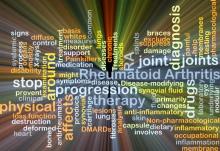Patients with rheumatoid arthritis have steadily made their initial clinical presentation with shorter and shorter symptom durations and less severe inflammation from the early 1990s into the 2010s, but this paradoxically has coincided with gradual increases in the severity of patient-reported outcome measures, according to findings from the Leiden Early Arthritis Cohort.
For 1,406 patients who met 2010 European League Against Rheumatism/American College of Rheumatology rheumatoid arthritis (RA) criteria during 1993-2015, investigators led by Wouter P. Nieuwenhuis, MD, of the department of rheumatology at Leiden (the Netherlands) University Medical Center found that the symptom duration at initial presentation declined significantly from a median 138 days during 1993-1996 to 97 days during 2011-2015. Although the frequency of autoantibodies at presentation did not change significantly, the median number of swollen joints decreased from 12 to 6, median tender joints declined from 21 to 10, and median C-reactive protein levels dropped from 24 mg/L to 10 mg/L (all P values less than .001). All these measures declined steadily during the five time periods analyzed (1993-1996, 1997-2000, 2001-2005, 2006-2010, 2011-2015). Median scores on the Health Assessment Questionnaire, which measures functional disability, stayed the same in all five time periods.
In contrast, patient-reported outcomes measures (PROMs) on visual analog scales for pain, fatigue, and disease activity all rose significantly from 1993-1996 to 2011-2015.
“Presumably, the present findings are not specific for RA, but reflect a general increase in societal pressure posed upon the individual over the years (i.e., society has become more demanding), whereby smaller health problems, which might be less visible, could be experienced as more disabling. In parallel, patients may also have higher health expectations themselves. Both phenomena likely contribute to a shift of reference when reporting outcomes,” the researchers wrote.
They added that the current findings, in light of previous studies that found that PROMs are not responsive to changes in the severity of inflammation, “raise the question if it is known what PROMs actually measure. Furthermore, this may have consequences for the monitoring of RA using PROMs or composite scores (e.g., Disease Activity Score or Simple Disease Activity Index) for defining remission.”
Read the full study in Annals of the Rheumatic Diseases (Ann Rheum Dis. 2016 Aug 24. doi: 10.1136/annrheumdis-2016-209949).


